One of the many issues with running Megagames in real world settings (or even well-established fictional settings) is that people have preconceptions. I came up against the issue in my own megagame, Everybody Dies, because who doesn’t expect the Boltons and Freys to screw you over?
Last weekend’s game, Barricades and Borders, was set in the 19th century. During this time, there was super massive industrialisation across Europe. Some countries grew in size and power, while some no longer exist. For game designer Brian Cameron, it was important that we didn’t naturally expect Britain to come out on top.
So the entire setting was fictionalised. We could guess that Albion was inspired by England, Franconium by France and The Khanate by Russia, but we didn’t know what aspects of those countries had been used, which had been borrowed from other nations, and which had been invented wholesale.
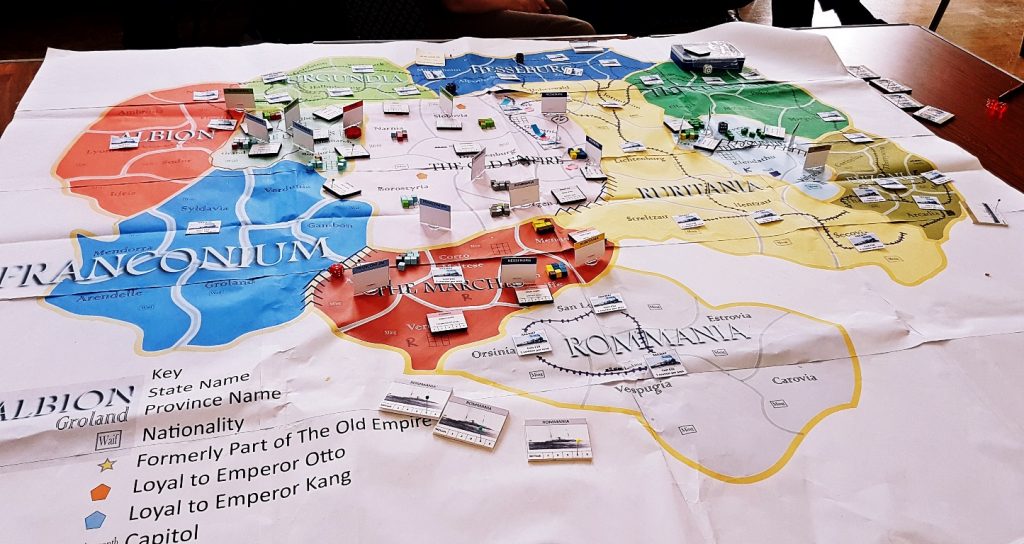
I had absolutely no preconceptions for this game – it’s not a setting I know and love, unlike Foxes & Devils and City of Shadows. But it’s actually ended up being my favourite Spring Calendar megagame… and here’s the story of why.
My Role at Barricades and Borders
I was cast as the Foreign Minister for Ruritania, a nation we guessed was inspired by Austria-Hungary. My role was to manipulate negotiate with the minor powers in the game, a.k.a. the countries too small to be player characters.
Heading up my team was Matt, who you may remember featuring heavily in my blog on Guelphs and Ghibellines. He was playing the glorious King Rudolph V, whose name caused no end of humour and even inspired our national anthem (more on that later).
The rest of my team were: Daniel as Secretary of State, responsible for negotiating with played states; Chris as War & Navy Minister, responsible for fighting our battles for us; and James, Colonial Minister, who would be leading expeditions in the great continents of Near and Far (genuine names), as well as treating with the Celestial Kingdom (totally not China). We were unfortunately down a player, so the duties of Finance Minister were split between me, Daniel and Matt.

L-R: Me as Foreign Minister, James as Colonial Minister, Matt as King Rudolph, Chris as War & Navy Minister and Daniel as Secretary of State
Ruritania’s Objectives
The objective for all the countries was to cement themselves as major powers in the inventively named continent of Continent. But the first half hour of the game was dedicated to selecting three more specific goals (from a choice of six), ideally ones that would push us towards less optimal styles of play.
We quickly decided there was no way we would be able to maintain the balance of power across the Continent – we had no intention of being the UN. And trying to keep Graustark and Slobovia uncontrolled – two of the most likely sates for Hesseburg to want to grab – was doomed to fail.
Colonisation, on the other hand, was a promising idea. It would bring in lots of money, and there was no reason we couldn’t be successful at it, since all the countries would be on a level playing field in Near and Far.
Our last three objectives were tougher to choose between:
- Lowest Unrest during the game: during the game, track on which turns you have the lowest Unrest level.
- Establish the most modern Armed Forces: at the end of the game the total of the technology levels of both the Army and Navy should be higher than any other such combination.
- Railways: have built railways in all home areas by the end of the game.
Unfortunately, increasing the technology level of the Armed Forces was more likely to lead to unrest, so those objectives were pretty much mutually exclusive. There was little mechanical advantage to having a large railway… but it was a relatively straightforward objective, so that was on the list.
Our gracious King magnanimously put it to a vote (probably intending to ignore the outcome). Armed Forces got only one vote, and the King agreed with the people, so Low Unrest was chosen as the final objective:
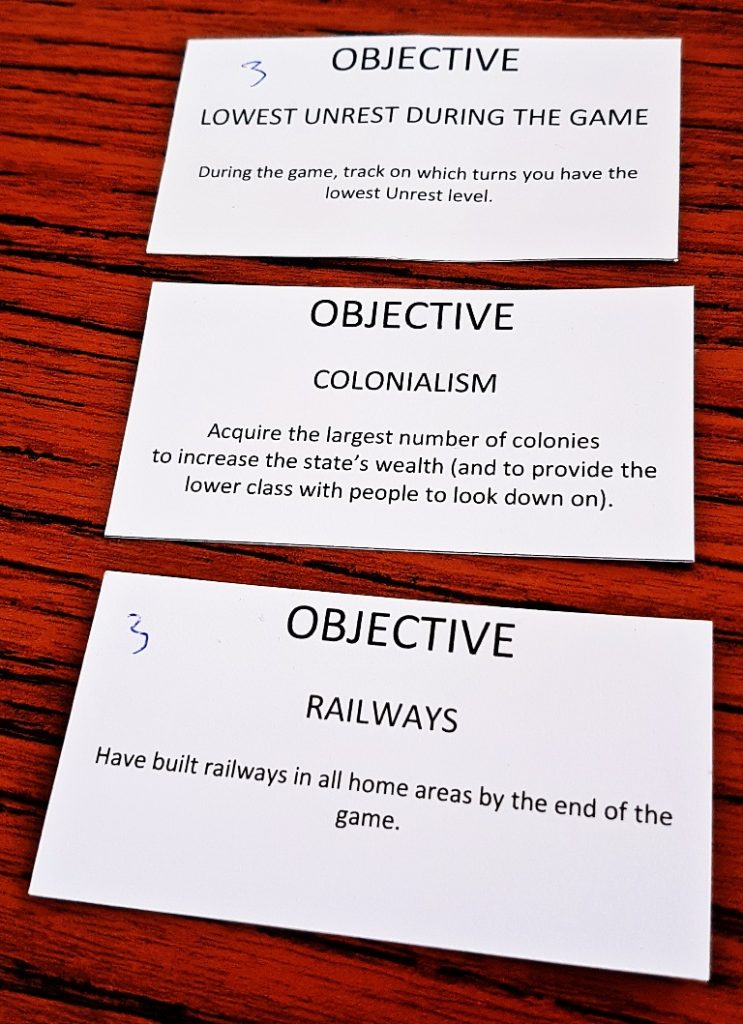
Friends, Foes and Trade Agreements
Once the game started properly, the most important task was to get some alliances with other players into place. his was mostly down to the Secretary of State, Daniel, but he was also running most of the Finance Minister’s tasks, so I jumped in to help.
The first treaty that we got signed was a three-way defensive pact with Franconium and Rommania. For us, this hinged on dividing up the NPC states that bordered both us and Rommania, but the Rommanians were perfectly happy with our proposed solution (a 3-2 split favouring them), and we signed off on the deal. We also secured a pretty good trade deal with the Rommanians
We expected our next treaty would be with Evzonia, a nation that bordered us to the East. But we were approached repeatedly by a representative from the Khanate – a very keen representative at that. I tried to put him off until Evzonia could put their bid in, but they didn’t seem keen to talk to us. Their loss! One swapped trade agreement, and we had signed a non-aggression pact with the Khanate.
Putting Ruritania on the Map
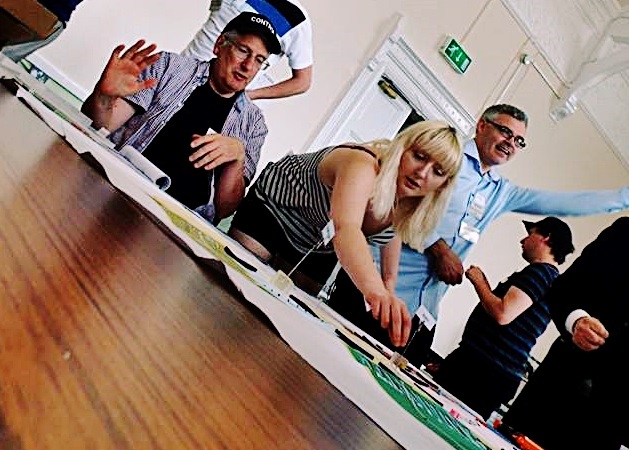
Image credit: Jim Wallman
Meanwhile, I was busy at the map table. This game was far more mechanical than most of the games I’ve played. My main role was to place “Influence Cubes” on the unplayed countries, trying to get a majority stake. Each country could take up to nine cubes, and you needed five or more to win them as an ally.
However, you had some influence in any country where you had placed at least one cube, which meant you could interact with the Events that occurred there. These events ranged from scandals over chocolate (not even kidding), to ill-conceived marriages, to border skirmishes, to all-out war.
To be honest, mechanical games like these aren’t really my strong suit. I’m far more used to megagames where you go to a Control member and bullshit negotiate with them based on fluff elements of the game, such as being of the same ethnicity or providing them with a shiny new statue or flattering their king or something like that. This game revolved around the cubes, and you could only influence a state during an Event. I was a bit stuck for what to do… not to mention pretty atrocious at the mechanics side of it! I’m much better hard-skilling persuasion.
But it wasn’t all disaster. I managed to secure Mendorra, who bordered us to the South-West, as an ally early on. I also managed to sneak small amounts of influence in the other Western countries that bordered us, which Hesseburg were keen to get as allies to block us off from the rest of the continent.
Domestic Affairs
At the end of each turn, we had to return to our tables for a Domestic Policy phase. This included a ton of different tasks: collecting taxes and revenue, dealing with Unrest, spending to maintain or improve our armies and navies, and building railways and monuments. We only built one Monument during the game – the Nasal Lighthouse (I told you the references to Rudolph would crop up again).
One of the really excellent parts of this game was the flow charts. When sorting out Domestic Policy, our Control Ben just took us through the sheet in order. Easy peasy!
Domestic affairs led neatly into team time. This meant we had a good block of 15 minutes when we were all back at the table. This contributed to something else I enjoyed about the game – a sense of unity, that my team were working together well. I’d say that out of the megagames I’ve been to, this team worked together most harmoniously.
Politics Damn Politics
One issue that could have divided us was politics. During the 19th Century, the percentage of people who had the vote grew from 4% to 18% (still no women of course). Myself and one other team member were Liberals, trying to push through political reform. Two of the others were Conservatives (far more conservative than the modern-day Tories), and our King was above politics.
We took a realistic approach to political reform. Mechanically, there were no benefits to keeping the political level low, and many teams ignored their briefs in favour of rushing straight to Political Level 4 or 5. But my team only slowly increased political freedom, ending the game on level 3. The King was quite adamant that he should remain the one true King to all his serfs. Allowing them access to modern nonsense like a free press and *gasp* universal male suffrage was sure to lead to anarchy.
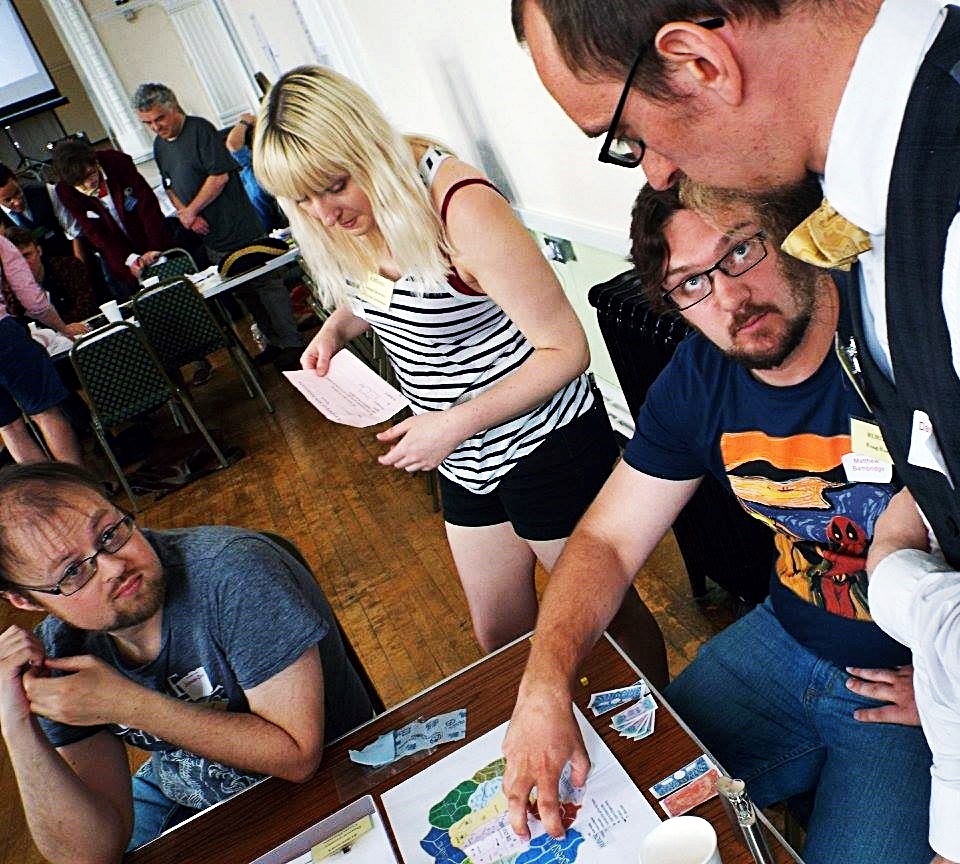
Image credit: Jim Wallman
Keep Your Enemies Closer
The country we were most worried about during the game was our northern neighbour Hesseburg. Hesseburg is one of the “newer” states who clearly had designs on land that is rightfully part of Ruritania. They had historical alliances with both their other neighbouring countries, so if they were going to invade anywhere, clearly it was going to be us.
Securing the Khanate, one of their traditional allies, with a non-aggression pact, had been a great move. There was only one downside – alliances had to be renewed each turn.
Evzonia, sour over missing out on an alliance with us, warned us repeatedly that the Khanate and Hesseburg were in talks to declare war on us, and for several turns we waited anxiously to see if the Khanate would refuse to sign our non-aggression pact. It seemed to all be hot air… until it wasn’t.
Two-Faced Allies
There was a phase in each turn called War Declarations. Realistically it wasn’t much different to the phases immediately before and after, we could do all the same activities. But there was one key difference – during this phase, countries could declare wars.
The first four turns had been dead quiet on that front, but there was always definite tension in the air until the screen clicked on to the next phase.
In turn five, we started to hear rumours that it wasn’t just Hesseburg and Khanate that had signed an Offensive Alliance against us – Evzonia were in on it too!
The big question became, should we declare war first? Alliances didn’t stack, i.e. if we declared against Evzonia, Hesseburg and the Khanate wouldn’t be obligated to help defend them, so it could be a smaller battle on our terms. But if they did decided to declare war on us in response, our allies Franconium and Rommania would still be obligated to defend us due to our Defensive Pact.
It was moot. On turn five, the Kings of Hesseburg, Evzonia and the Khanate got up on stage… We had been sure we could beat Evzonia on our own, or the other two with our allies. The three together posed a much greater threat.
World War One
We had already planned a land route for our allies in Franconium and Rommania to send troops to defend us, and they would also be sending their navy.
Game turns lasted 5 years, so combat was resolved on a very high level. For example, it didn’t matter than Franconium was travelling across most of the continent to get to the war.
I actually took two livestreams of the war:
But in case you don’t want to watch them, I’ll give you the lowdown.
I had to watch from a distance, because the map table was crowded with control and 6 different military leaders. I had little idea how the war mechanics were actually resolved, so I wasn’t at all sure on the odds for our victory.
But it became clear once the resolution begun that things weren’t looking good for us. Control use the well-established rule of “put the winning counter on top of the losing counter”, and we were being overrun. We lost every single land battle except one.
It Ain’t Over
Then the teams began lining up some other counters. I was confused what these were for a while, until I realised that we also have navies… and then I was confused as to which side was ours, and was convinced we were outnumbered by 50%, and losing the sea battle.
I went back to my table to report the bad news, when I realised my Army/Navy guy was looking far more pleased than he should be. In fact, we won every single naval battle.
We waited with bated breath to find out who had won overall. Not knowing the rules, I had literally no idea. Was the sea battle just a formality? Did it count less than the land battle? Did it count equally but we just about lost?
In actual fact… we won. We won by a single battle, meaning winning that first land battle had pulled us through.
But the spoils of war were not what we’d hoped. While Hesseburg and the Khanate paid war reparations to our allies, Evzonia was first ordered to cede a territory to us, but that changed to us receiving a colony from them. A small, crappy colony… But it was a colony nonetheless, which helped towards our Colonisation goal.
And I built a Victoria Station, just over the border from Hesseburg. Not rubbing it in, or anything.
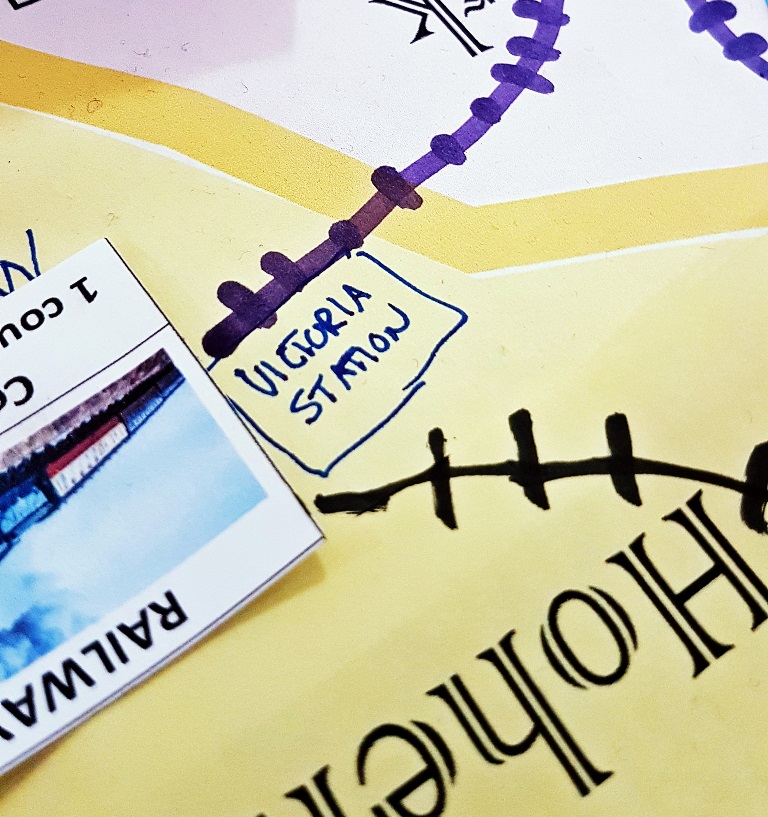
The Next War
Almost immediately, my King began preparations for the next war. We were bound into a peace treaty with our opponents for a turn following the war, but we intended to declare against Evzonia the turm after.
And our allies? You’ll never guess – the Khanate.
For some reason (that is still mysterious to me now), Evzonia ended up with a lot of the blame for the last war. And for some reason, the Khanate were now trusted by us, despite their treacherous behaviour in the run up to the last war.
At the same time, our allies Franconium and Rommania were planning an invasion of Albion, and asked for our help. Our response? We will be “otherwise engaged” that turn… When Franconium declared, both the Khanate and Hesseburg reneged on their pact to defend Albion. This cost them dearly in the honour stakes and formally broke their alliance.
To Surrender or Not To Surrender

We declared on turn seven, with our frenemies the Khanate alongside us. Evzonia initially surrendered before we took the battle field. They dithered over peace terms (i.e. they were unhappy that surrendering meant they couldn’t negotiate the terms), and in the end decided to take us on. In game-world terms, they’d taken 5 years to decide to go to war.
We were hoping to use the war to carve up Evzonia between us. They’d taken two NPC states and integrated them into their country, and we each wanted one. Well, actually the Khanate wanted one, and we wanted to bait-and-switch for some of their colonial territories.
The next turn arrived, and we took the field. It was a slaughter, quite simply. But the peace talks went awry. Rather than the colonies we wanted, we simply got our (quite small) war reparations paid. We were rolling in cash, so this was far from good news.
Prestige and Power
Throughout a lot of the game – three turns in total – Ruritania had topped the Prestige tracker. Displayed at the front of the room, it was a much more mechanical prestige tracker than at most other megagames, and prestige was earned for things like winning battles, gaining colonies and building monuments.
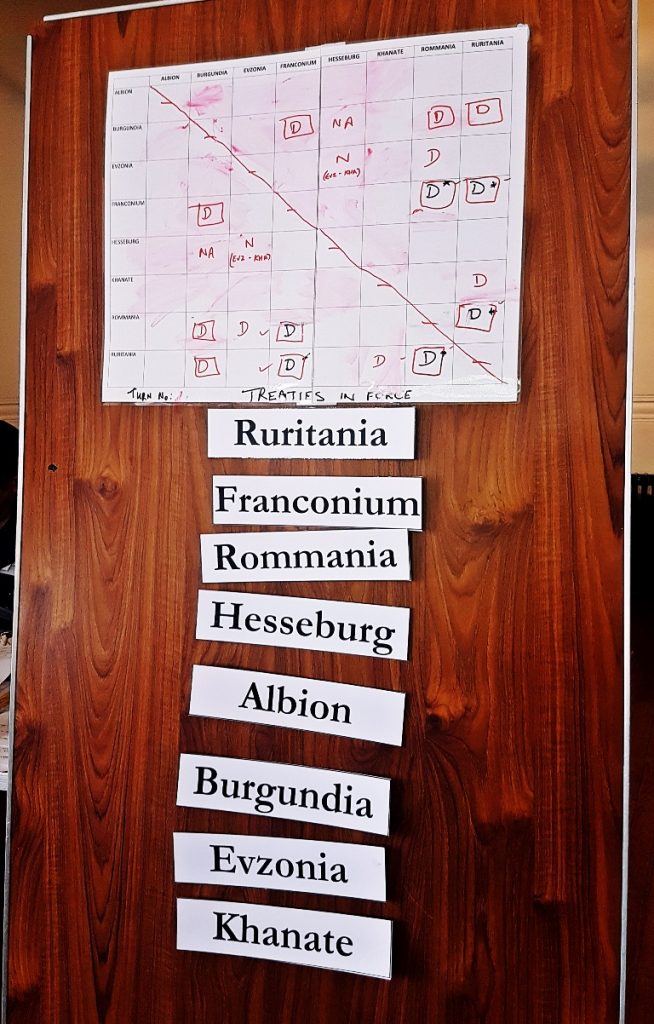
As we entered turn eight, the top three positions were held by those in the remaining valid alliance. The RuriRommaFranco Defensive Alliance had held for the entire game, and even added Burgundia to it late in the game. Peace in Continent was hopefully on the horizon.
But before then, we had a war with Hesseburg to look forward to. The three of us were the great power in the world, and Hesseburg was our greatest enemy. Defeating them would (hopefully) bring peace to the world.
When Don’t I Get Married?
Meanwhile, the alliances in the minor NPC countries were beginning to break down. A rules change meant that other countries could muscle in on existing alliances, which lost us our alliance with San Seriffe and was beginning to endanger the one with Mendorra.
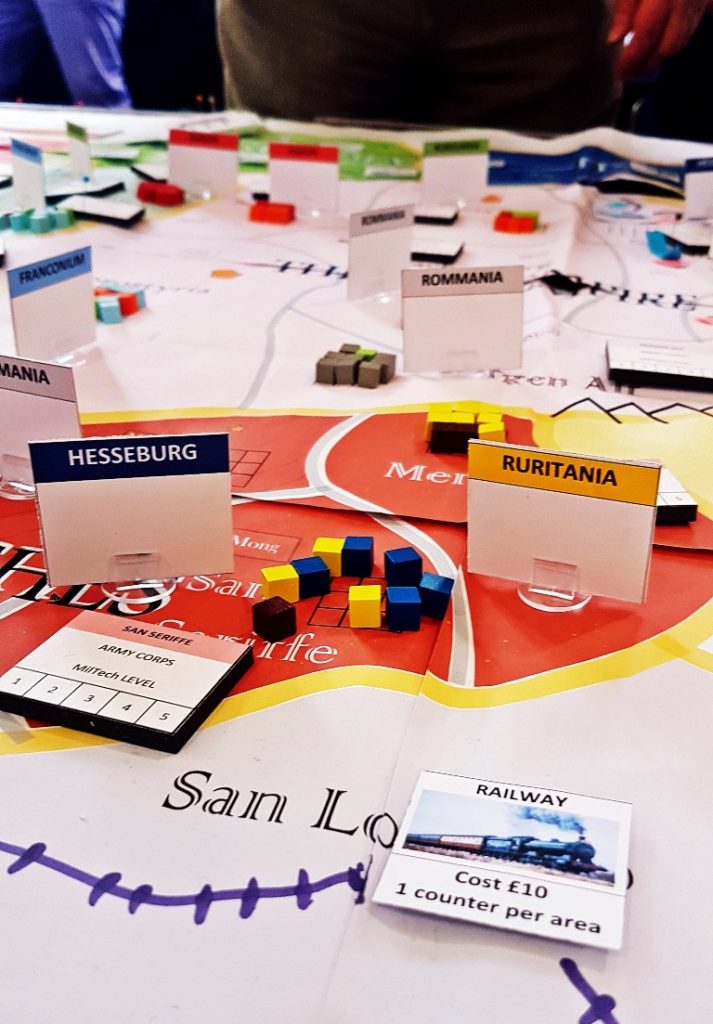
Many of the other countries had managed to incorporate the countries into their own nations, and I was keen to do that with Mendorra. Sadly, you needed an Event of a certain type to do that, and Control managed when the events occurred.
Not content to wait for it to crop up, I took matters into my own hands. The King had just adopted me into the royal family, so I took that as my cue to seek out a wife.
Luckily Control was amenable to my plan. I had to roll a fair few dice in order to find out whether Mendorra had an eligible daughter, but I was in luck – the King had only two children, both daughters. I immediately proposed to the eldest, and invested 15 moneys into the wedding.
But that wasn’t enough. All this would do is trigger an event – a “Crisis” involving an unfavourable wedding.
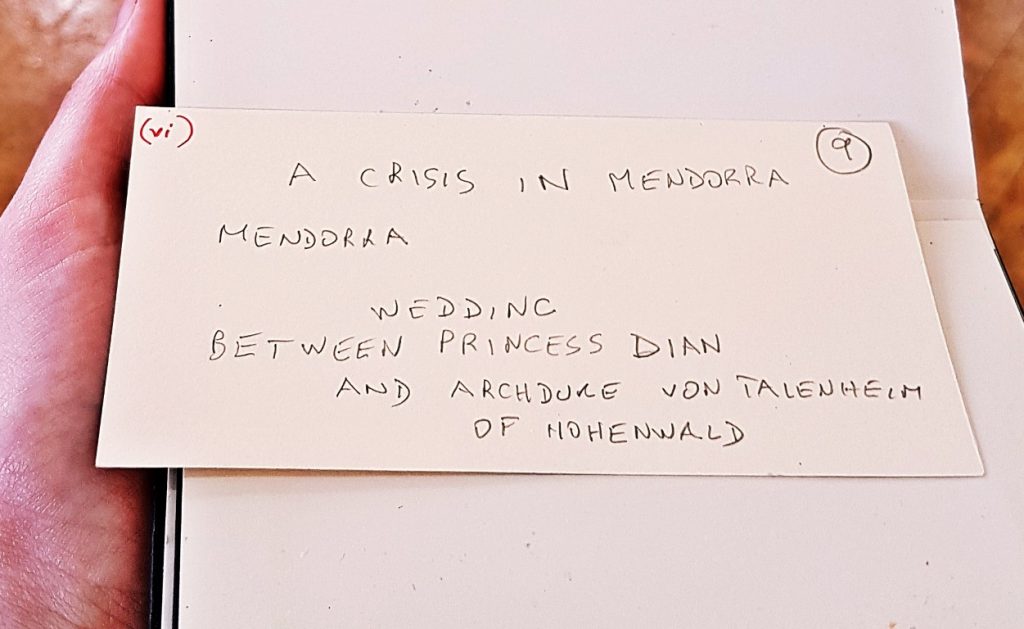
And everyone with Influence in that country – us and Evzonia – could try to influence the outcome. The battle wasn’t over yet, and I set about collecting as many Event cards as possible to go in fighting. I didn’t fool myself though – I’d lost every Event I’d been involved in. The wedding would never happen. But I would fight as hard for my bride as I could!
One More Turn!
But in fact, the fight was over. I never got my Princess, and we never managed to take on Hesseburg.
The Continent was still a fractured nation, although the strong alliance between Ruritania, Franconium, Rommania and Burgundia would surely lead the nations to prosperous times. The duplicity of the Khanate would likely ensure they wouldn’t be invited to the party. The threat of Hesseburg lingered to the North. Albion had surrendered to Franconium, in an earlier fight, and Evzonia was so thoroughly smashed in our battle it was unlikely they would ever be a major power again. Most of the NPC countries had been divided up between the major powers, either as strong allies, vassals or formally incorporated. Meanwhile most of Near and Far had succumbed to the rule of one of our nations.
40 years had played out, and the face of the world had changed. And we had been the ones to change it.
Had we achieved all our objectives? We had a lovely railway, and tied for the highest number of colonies (let’s not even talk about the unrest though).
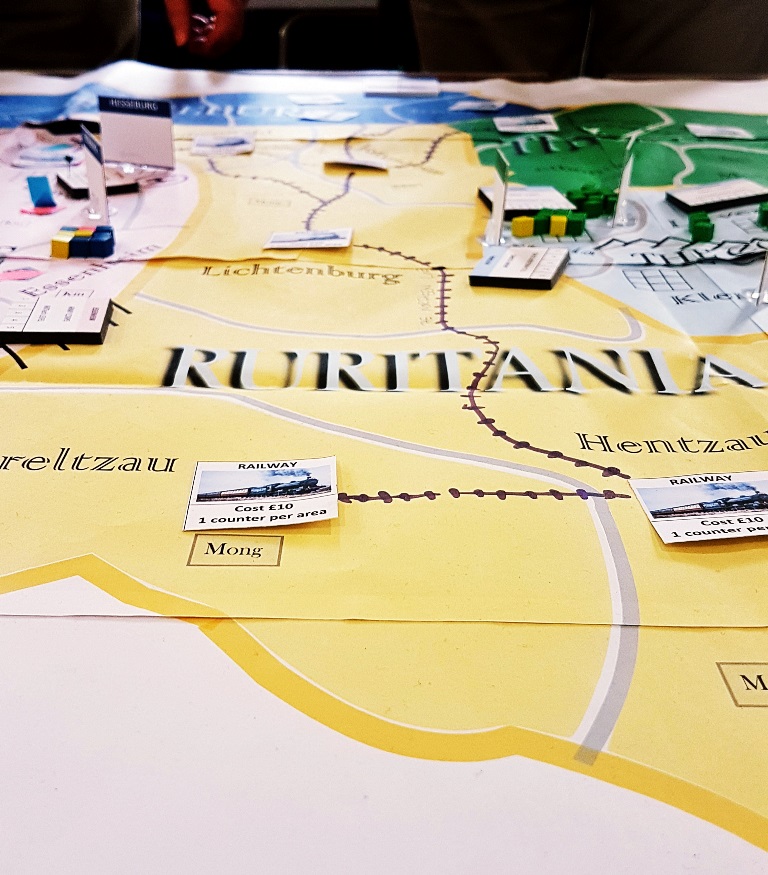
But most importantly. The people of Ruritania were part of a proud nation, a country that would lead them boldly into the future. And they would sing the national anthem with pride.
#sorrynotsorry
The next Megagame I’m at is the international Urban Nightmare: State of Chaos, running in 10 cities around the world simultaneously. Many locations still have spaces left, so try to get involved – it will be a once in a lifetime experience!
